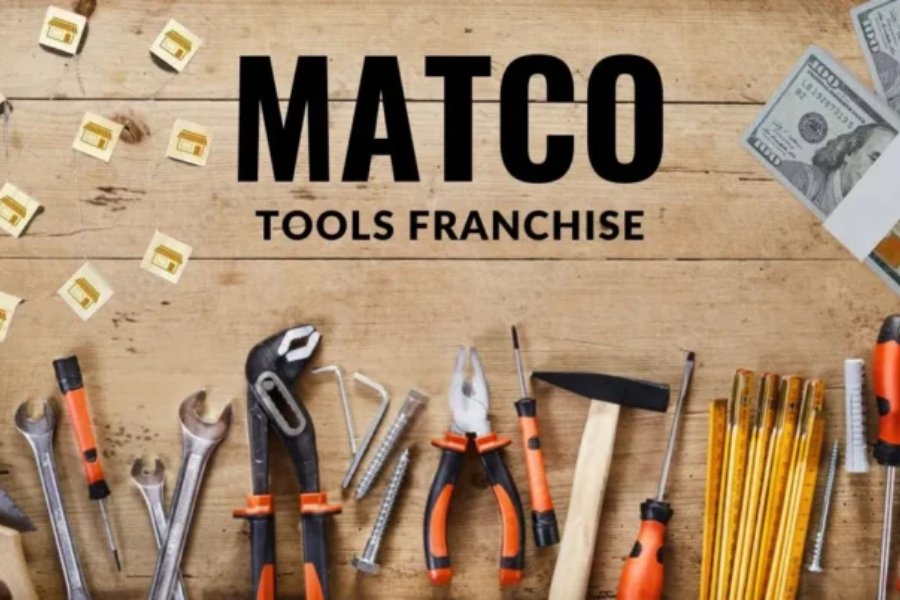Are you an aspiring entrepreneur looking to start a Matco Tools franchise? Before diving into the world of franchise ownership, understanding the Matco franchise failure rate is crucial. While the idea of being your own boss and running a tool truck filled with premium goods can be enticing, success in this business isn’t guaranteed. This article will provide a comprehensive look into the world of owning a Matco Tools franchise, including the potential pitfalls, failure rates, and tips for navigating challenges to achieve success.
Who Owns Matco Tools?
Matco Tools is owned by Fortive Corporation, a diversified industrial growth company. Fortive, founded in 1946, operates a range of subsidiaries, including Matco Tools, which is well-known for its premium automotive tools. Fortive is a publicly traded company, meaning its ownership is spread among shareholders who buy and sell company stock. Through Fortive’s leadership and resources, Matco Tools is positioned to innovate and maintain its reputation in the automotive maintenance tools industry.
Matco operates within Fortive’s broader strategic framework, benefiting from its industrial portfolio and market leadership. This backing ensures Matco Tools remains competitive in an ever-evolving market, but franchisees must navigate this market independently while aligning their business practices with Matco’s brand reputation.
About the Matco Franchise Business Model
Matco Tools is a well-known name in the automotive industry, famous for providing high-quality tools and equipment to mechanics and auto shops. As a Matco franchise owner, you are not just selling tools—you are tapping into a brand with a strong reputation and a broad customer base. The business model operates on a mobile sales distribution system, meaning franchisees sell tools directly from their trucks to customers, often mechanics and service centers, within a defined territory.
While the brand recognition of Matco Tools gives franchisees a head start, owning a Matco franchise is no easy task. The automotive industry is growing rapidly, driven by constant demand for vehicle repair and maintenance. However, this market also faces unique challenges, such as technological advancements in automotive systems, changing consumer preferences, and stiff competition from other tool suppliers. Franchisees must adapt quickly to stay ahead of these trends and secure their customer base.
What is the Matco Franchise Failure Rate?
A common question for prospective franchisees is: “What is the failure rate for a Matco franchise?” Even if the precise numbers for Matco Tools franchise failures are not made public, it’s crucial to take overall franchise failure data into account. According to the Small Business Administration (SBA), about 20% of small businesses fail within their first year, and around 50% within five years. These figures offer a snapshot of the risks that entrepreneurs face, including those involved in franchise businesses like Matco Tools.
For those considering a Matco franchise, conducting thorough market research is key to understanding potential risks. Speaking with current or former Matco franchisees about their experiences, learning about customer satisfaction, and reviewing financial data can help provide a clearer picture of what you’re stepping into. Evaluating the Matco franchise failure rate against your risk tolerance and business goals is essential to making an informed decision.
Key Reasons Behind Matco Franchise Failure
Owning a Matco Tools franchise comes with its challenges, and understanding why some franchises fail can help future owners avoid the same pitfalls. Here are some of the most common reasons why Matco franchises may struggle:
1. Underestimating Financial Commitment
Many franchisees enter the business without fully grasping the financial requirements beyond the initial investment. Costs related to truck maintenance, inventory, franchise fees, and royalties can quickly add up, especially during the early stages of the business when revenue may be lower than expected. Without adequate working capital, franchisees can find themselves in a financial bind.
2. Lack of Business Experience
A lack of experience in business management or the automotive industry can hinder a franchisee’s ability to make informed decisions and adapt to market changes. Franchisees who underestimate the complexities of managing a small business—such as handling finances, customer relationships, and inventory—are more likely to struggle.
3. Poor Location Selection
A Matco franchise’s territory can have a big impact on its performance. Poor location selection, where competition is high or customer demand is low, can significantly affect sales. Franchisees need to thoroughly analyze their territory and understand local market dynamics before starting their business.
4. Saturated Market
The professional tool industry is competitive, with major players like Snap-on and Mac Tools occupying a significant portion of the market. In some areas, these companies have already established a strong customer base, making it harder for new Matco franchisees to carve out their niche.
5. Demanding Work Schedule
Running a Matco Tools franchise is far from a 9-to-5 job. Franchisees must be prepared for long hours on the road, often visiting clients in person to foster relationships and make sales. The physically and mentally demanding nature of the work can lead to burnout, especially if sales are slow.
What is the Return Policy for Matco Tools?
Matco Tools takes pride in customer satisfaction and has a straightforward return policy to accommodate its clients. While specific details of the return policy may vary depending on the distributor or the product, here are some general guidelines:
- Flexible Returns: Matco Tools typically accepts returns within a certain period, provided the customer has proof of purchase. This flexibility helps build trust with customers and encourages repeat business.
- Policy Verification: It’s recommended that customers check directly with their Matco distributor or visit the company’s website for the latest return policy details. Keeping abreast of these policies can help franchisees manage customer expectations and avoid disputes.
Sorting Fact from Fiction: What Leads to the Failure of Certain Matco Tools Franchises?
Franchise failure can happen for various reasons, and the Matco franchise failure rate is influenced by both internal and external factors. Understanding why some franchises fail while others succeed is crucial for anyone considering this path. Here are some factors that contribute to franchise failure:
1. Low Barrier to Entry
Because Matco Tools franchises have relatively low barriers to entry, some franchisees may start the business without enough industry knowledge or sales experience. This lack of preparation can lead to poor business decisions and difficulty in sustaining long-term success.
2. High Initial Investment
Starting a Matco franchise requires a significant upfront investment, including the cost of the tool truck, inventory, and franchise fees. For those with limited capital or insufficient financial planning, this initial outlay can be daunting, especially if sales don’t meet expectations early on.
3. Limited Franchisor Support
While Matco Tools offers initial training and support, some franchisees feel that ongoing assistance—particularly in marketing or territory development—is lacking. Without continued guidance, new franchisees can feel isolated in navigating market challenges.
How Risky is a Matco Tools Franchise?
Owning a franchise always carries a certain level of risk, and a Matco Tools franchise is no different. While the established brand and structured business model provide a solid foundation, the success of a franchise depends on factors such as the franchisee’s management skills, market conditions, and economic factors. Here’s how to evaluate the risk:
- Advantages: Franchisees benefit from Matco’s proven business model, established brand, and existing customer base. These elements can give you a head start compared to starting a business from scratch.
- Challenges: High competition in the professional tool industry, the demanding nature of the work, and ongoing financial commitments present challenges that franchisees must be ready to tackle.
Alternative Opportunities in the Tool Industry
If you’re hesitant about committing to a Matco Tools franchise due to concerns over failure rates or other factors, there are alternative paths within the tool industry to consider:
1. Independent Tool Sales
For individuals with industry knowledge, becoming an independent tool salesperson may offer more flexibility than owning a franchise. Independent salespeople can source products from a variety of manufacturers and build their customer base without being tied to a single brand.
2. Specialized Tool Repair
Mechanics rely on high-quality tools, many of which require regular maintenance and repair. Specializing in tool repair services can provide a steady income stream while building lasting relationships with local shops and technicians.
3. Online Tool Sales
E-commerce continues to grow, and starting an online tool store is a viable option for those with a knack for digital marketing. While this route removes geographic limitations, it requires strong branding and a robust online presence to stand out in a competitive market.
Steps to Ensure Success in Your Matco Franchise
If you’re still determined to start a Matco Tools franchise, there are several steps you can take to enhance your chances of success:
- Conduct Thorough Research: Understand the business model, competition, and market dynamics in your area. Research can provide critical insights that help you make informed decisions.
- Talk to Current Franchisees: Speak with current and former franchisees to gain firsthand knowledge about what works and what doesn’t.
- Seek Professional Guidance: Consult with a franchise attorney and business advisor to ensure you are fully aware of the financial and legal implications of franchise ownership.
Key Questions to Ask Yourself Before Investing
Before committing to a Matco Tools franchise, ask yourself the following questions:
- Do you have the sales skills and work ethic needed to succeed in a competitive market?
- Are you prepared for the financial investment and long hours required?
- Are you passionate about the tool industry and building relationships with customers?
Conclusion
Understanding the Matco franchise failure rate is essential for anyone considering this business venture. While the failure rate may seem daunting, success is possible with the right preparation, dedication, and adaptability. By conducting thorough research, seeking professional advice, and learning from current franchisees, you can mitigate risks and increase your chances of building a profitable business. Whether you decide to pursue a Matco franchise or explore alternative opportunities in the tool industry, success will ultimately depend on your ability to navigate challenges and stay focused on your goals.



